Ajami is a centuries-old practice of writing other languages using the modified Arabic script, deeply embedded in local histories and socio-cultural practices, mediating commerce, politics and social life in many regions of West Africa. Downplayed by Arabic and European colonial administrators, systematic attention to African Ajami has only started as an effort by African scholars in the post-colonial era.
Grassroots Ajami literacy has been historically high in the communities of West Africa. While often viewed through the lens of its religious-historical origins, it is increasingly evident that the use of Ajami scripts in a variety of African languages extends far beyond religious and educational contexts. African Ajami can be observed in a growing multiplicity of secular environments, including interpersonal communication, commercial advertising, street posters, billboards and road signs, political campaign ads and the insignia of local businesses and services.
Ajami, which is the centuries-old practice of writing other languages using the modified Arabic script, is deeply embedded in local histories and socio-cultural practices, and we suggest that it should be analysed within such a context. Arising from Islamic clerical and educational campaigns of the 15th–16th centuries, Ajami constituted an early source of literacy for a variety of local languages in Sub-Saharan Africa, including Yoruba, Mande, Wolof, Fula and Afrikaans. Its history refutes the oft-prevailing claims that Africa lacks written traditions. The downplaying and devaluing of the significance of African Ajami has long characterised Arabic as well as European scholars and administrators of the colonial era, and this legacy still persists, perpetuating racial stereotypes, limiting political participation and obscuring ethnographic accounts of local practices and institutions.
Having flourished for centuries, Ajami has established itself as an important means of communication and a mediator of historical and contemporary knowledge in many areas of Africa where Qur’anic schools have been the primary source of education. Consider the example of Senegal. It is estimated that over 50% of the population of this ‘French-speaking country’ are illiterate in French, and adequate skills in written and oral French largely remain the purview of urban elites. Many ethnic groups of the country, including Wolof, Pulaar and Mandinka use Ajami scripts for their written communication. Ajami Wolofal (the language of the Wolof ethnic group) is used for both religious and secular purposes in the local communities, including personal written communication such as private letters, as well as in business records and advertisements of the informal sector.
![A mill owner’s advertisement for grinding grains reads: ‘Ku bëgg wàllu wàlla soqlu wàlla tigadege wàlla nooflaay; kaay fii la. Waa Kër Xaadimu Rasuul [If you want (your grains) pounded or grinded or peanut butter effortlessly; come here. The People of The Servant of the Prophet (Ahmadou Bamba)]’.](https://blogsmedia.lse.ac.uk/blogs.dir/18/files/2019/09/Image-1-e1569940925654.jpg)
It is interesting to note that the role of Ajami as an effective tool to reach grassroots communities has not gone unnoticed by large multi-national corporations expanding their business in Africa, as well as by organisers of national and local political campaigns. The adverts of mobile telephony and mobile money services of large telecommunications companies such as Orange S.A. and Tigo of Millicom adorn huge billboards on highways and can be found painted on the walls and fences of modest neighbourhood shops and kiosks.
In the Diourbel area of Senegal where Ajami dominates French literacy, a majority of important public announcements are first issued in Ajami, and then translated into French for wider national outreach. It is no surprise that companies such as Orange S.A., a French multinational telecommunications corporation, have understood the economic and social benefits of reaching their consumers in locally accessible and accepted ways.
![2.Shopkeeper’s Ajami advertisement in Diourbel, Senegal, reads: ‘Fii dañu fiy wecciku ay Qasā’id aki band(u) ak kayiti kaamil aki daa” [Poems, audiocassettes, Quran-copying quality paper and ink are sold here]’. TIGO is a reference to a mobile phone company.](https://blogsmedia.lse.ac.uk/blogs.dir/18/files/2019/09/Image-2-e1569940948145.jpg)
The growing use of Ajami in public life can also be observed in neighboring Nigeria. During the 2019 Nigerian general elections, for instance, political posters using Ajami script were widespread among Nupe language speakers in the country. The Nupe ethnic group is situated in the Middle Belt and northern Nigeria, and widespread in Niger State as well as in Kwara and Kogi States. The origins of the ethnic group trace back to the 15th century when Nupe formed loose confederations of settlements along the Niger River. Converting to Islam in the late 18th century, they retained many indigenous features of social organisation and cosmology. Nupe have also historically maintained close contacts with their Yoruba and Fula neighbours, now all part of a large multi-ethnic state.
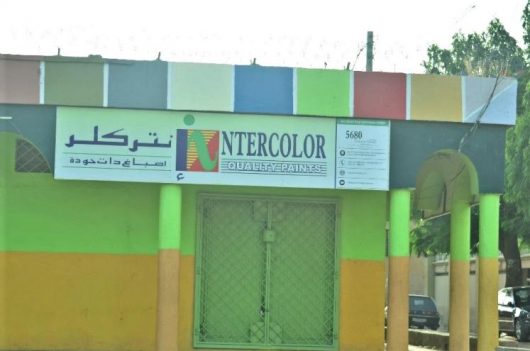
Below are examples of political campaign posters in Ajami Nupe, collected by Mustapha Kurfi, during the Nigerian general elections in February 2019, with incumbent president Muhammadu Buhari (All Progressives Congress) winning his re-election bid with 55.6%, against the 44.2% of the opponent Atiku Abubakar (People’s Democratic Party). The political posters feature Ajami Nupe in national and regional political campaign materials.

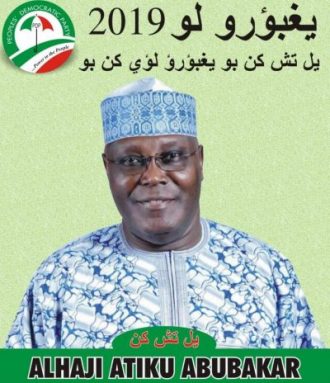
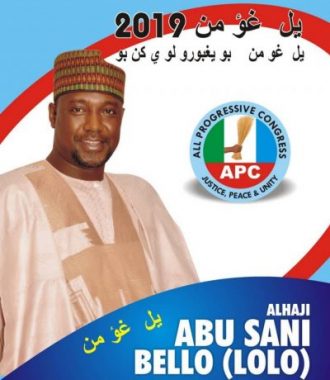
While Ajami is thus increasingly used as a mass communication tool in the commercial and political life of numerous West African ethnic groups, there is still room for the formal recognition of its central role in mediating the grassroots by African national governments, supra-governmental bodies and international development actors. Although there exists an increasing scholarly awareness about the importance of studying diverse historical records of African Ajami, few are those who know about Ajami as a fascinating lens into everyday livelihood practices, political struggles and social imaginaries of many contemporary African communities.
The Boston University African Studies Center is working on the research project Ajamī Literature and the Expansion of Literacy and Islam: The Case of West Africa with a NEH Collaborative Research Grant. Collecting, digitising and interpreting manuscripts in Ajami in four major West African languages – Hausa, Mandinka, Fula, and Wolof – the project provides a new window into the history, cultures and intellectual traditions of West Africa.


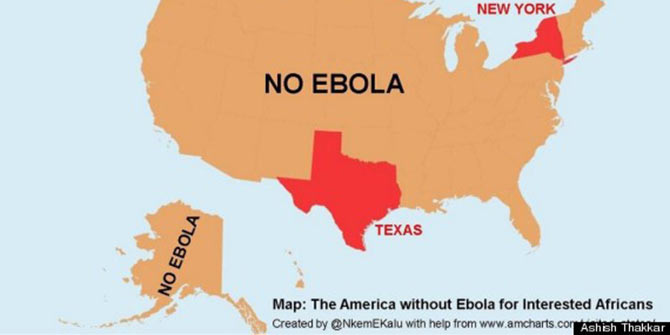
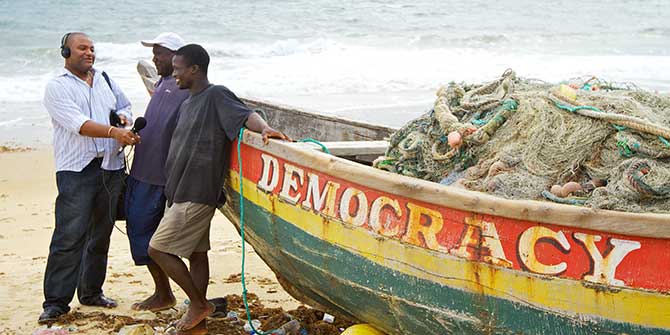


My understanding was that Ajami was Hausa language in Arabic alphabet. But, this and other writings have opened my eyes to the knowledge that Ajami (in Arabic: أجمية), is the use of Arabic alphabets to write any language. Thank you very much